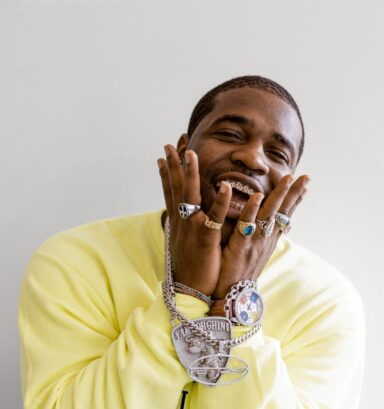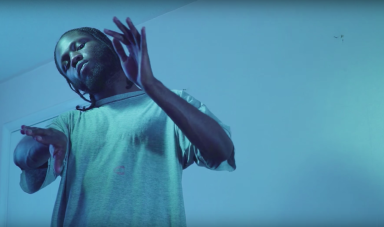A fantasy of a life without constraints
Simon Reynolds talks to Beatrice Finauro
We met Simon Reynolds in Milan while he was touring Italy in July to present Post Punk, that has been republished by Minimum Fax. Reynolds’s writing has blended cultural criticism with music journalism. He has written extensively on gender, class, race and sexuality in relation to music and culture. He published a number of full-length books on music and popular culture, ranging from historical tomes on rave music, glam rock, and the post-punk era to critical works such as Retromania: Pop Culture’s Addiction to Its Own Past. Simon Reynolds’s thesis is that rock music is now simply feeding off its own past and that if we want to find out which is the music that represents the contemporaneity at its best then we need to look elsewhere. As soon as I mentioned the interview, Reynolds said that Trap is his favourite music since a while and he’s happy to explain why.
Trap is new, it’s disruptive, it’s the absolute denial of Nostalgia in terms of music. To me, it’s beyond the hauntological music scene, the electronic experimentations, the hypnagogic pop and the Vaporwave. On the other hand – and I don’t want to sound too old-fashioned here – the approach to some matters such as women, wealth, social Darwinism, sounds a little conservative, doesn’t it? Is it time to leave behind the idea that subcultures bring along with them some input for the change?
Yes, Trap is absolutely now, it uses fragments of history when they suit its purposes: one track on Culture II features a talk box solo as a coda, which is Migos nodding to the history of vocal processing and specifically to Roger Troutman of Zapp, and another track sounds like it has vocoder for one section on it, for same reasons, I think. But it has none of the retro melancholy of hauntology, vapor wave etc…
The lyrics are non-progressive in the way that the vast majority of Rap has always been. Conscious Rap has always been a minority interest, often appealing more to white college audiences than the street hardcore of rap fandom. Rap simply *is* ego, alpha male swagger, wealth display, crime as either a reality or a metaphor for a life lived without limits. Women are treated as trophies or sexual disposables. Beta males aka haters are scorned and defeated (endless tropes of treating your wife as my ho). Rivals are vanquished in a war of all against all. The parallels with current politics are clear – there’s a reason why Rae Sremmurd did a song called ‘Up Like Trump’. Kanye’s identification with Trump makes total sense. But really Rap is just American to the core, its ideology is chase your dreams hard enough and you can’t fail (the great American lie-dream, it’s enduring ideological sleight and confidence trick). Winners win because they wanted it harder, losers lose because they don’t have the right positive attitude. Wealth is for flaunting.
Progressives can recoil and reject rap for these values, or they can listen for the inexhaustible creativity with which these tropes and fantasies are rewritten. You can also listen to rap precisely as a psychoanalytic diagram of capitalist desire, the American ideology literally laid bare. While also admitting to yourself the seductivess of these fantasies.
You can also hear it as a voice of black male pride and largeness of spirit, in the face of a society that devalues and demeans them. It’s not necessarily going to express itself in a woke or liberal-progressive way, but that anger and pride is in there. I’m listening to Migos right now and I just heard the lyric ‘fuck the system’. I have been saying these things about Rap literally from the start of writing about Hip Hop, in 1986- in a piece called ‘Nasty Boys’. In some ways nothing has changed since Schoolly D and LL Cool J. But the music has kept on evolving, and so have the flows, the language, etc. I’ve long thought there is a connection between socially regressive attitudes and emotions and the musically progressive. What I call the Lumpen Vanguard.
So, by using a definition of yours, do you see a ‘Continuum’?
The continuum is Hip Hop, It doesn’t stop. I have thought it was running out of ideas several times before (last time was around 2009) but going to try to avoid making that mistake again. Until America society changes, the reasons that hip hop exists will maintain and pertain. And the extent to which other countries go American, i.e becoming post-socialist, Rap and Trap will resonate and inspire local versions.
Is Trap a heresy, a new classic canon or both things at the same time?
On one hand, Trap is just Rap – the same old, same old. Gangsta Rap, part 12. If you listen from a distance, you won’t hear anything you’ve not heard before. But immerse yourself in the music, and you hear a host of micro-innovations. Most of them are in the domain of vocals – the creative use of auto-tune and other vocal processing, the emergence of ad libs as kind of antiphonal commentary on or reinforcement of the lead vocal, the blurring of rapping with singing so that you can’t distinguish between rhythmic speech and melodic trills. The other innovations are in the domain of personality – there has never been a character and a vocal presence before like Future’s, or Young Thug’s, or Chief Keef.
Adam Harper defined the characteristics of Hi-Tech aesthetics Vs Indie aesthetics. I think some of the features of Hi-tech, such as the harsh vision of the future, being decadent, excessive and aggressive, and originally linked by Harper to artists such as James Ferraro, Laurel Halo and Oneohtrix Point Never, can be also attributed to the Trap genre. On the other hand, we have the supposedly warm, benign, archaic and, I’d say, lifeless realm of Indie to which the Trap is opposed. In your opinion, which are the main Trap’s features and where does Trap lie in the contemporary ecosystem?
The supposedly subversive or parodic elements of Vaporwave or Hi-tech / Hi-def – to me they pale next to the reality of what is streaming out of the mainstream airwaves. Which is to say the hyper-reality of it, a lifestyle that is fantastical, psychotic. What could be more insane or morbid than the subjectivity in a Drake record or a Kanye song? The black Rap n B mainstream is further out sonically and attitudinally than anything the white Internet-Bohemia has come up with. Their role is redundant. Rap and R&B, Travis Scott, the Weeknd, Cardi B, Migos: is already the Simulacrum, is already decadence. I call it Weimar n B.
Trap spans from the original formula, such as the one of Gucci Mane, T.I, Young Jeezy, to the Ebenezer’s one, influenced by R&B and Gospel, to London’s Drill and so on… And each country has its own version. Is there a common ground, rule or standards that is cross to the different types of Trap?
There are certain beat patterns that recur (yet also a surprising diversity of grooves and feels). You can connect Trap back to early 2000s sounds like Crunk and New Orleans Bounce – the idea of the Dirty South – to labels like Cash Money. I suppose if there are two things that define all 21st Century Hip Hop is that it doesn’t use samples very often and it breaks with the looped breakbeat approach of classic East Coast Hip Hop. The beats are programmed and relate to a longstanding Southern U.S Hip Hop tradition that was rooted in drum machines and 80s Electro. Trap is part of that, as was the related L.A. sound of Ratchet as pioneered by DJ Mustarf. But in a larger sense it’s all trap, it’s all gangsta rap, it’s all rap. There’s an absolute continuity, a changing same to quote Amiri Baraka.
Why does Trap have such an influence on kids?
Kids want something that feels now and that belongs to them, and Trap is the most convincing and intoxicating contender for that role. Most other forms of youth music are static or overly shadowed with heritage and history.
The other thing is that Trap is one of the few music around that drips with jouissance and with a disruptive energy. Trap – especially Migos and Young Thug, but all of it – is ecstatic. The performers seems entranced by themselves, in a swirl of ecstasy and glory. Think of the feeling in Rae Sremmurd ‘Black Beatles’. The fact that their trope for that feeling of excess, triumph and abandon is rock stardom tells you something. This is supplying what kids got from the Rolling Stones or Led Zeppelin: a fantasy of a life without constraints.
Cover: frame from Gucci Mane’s NSFW video for All My Children,2016, directed by ASHXANA


